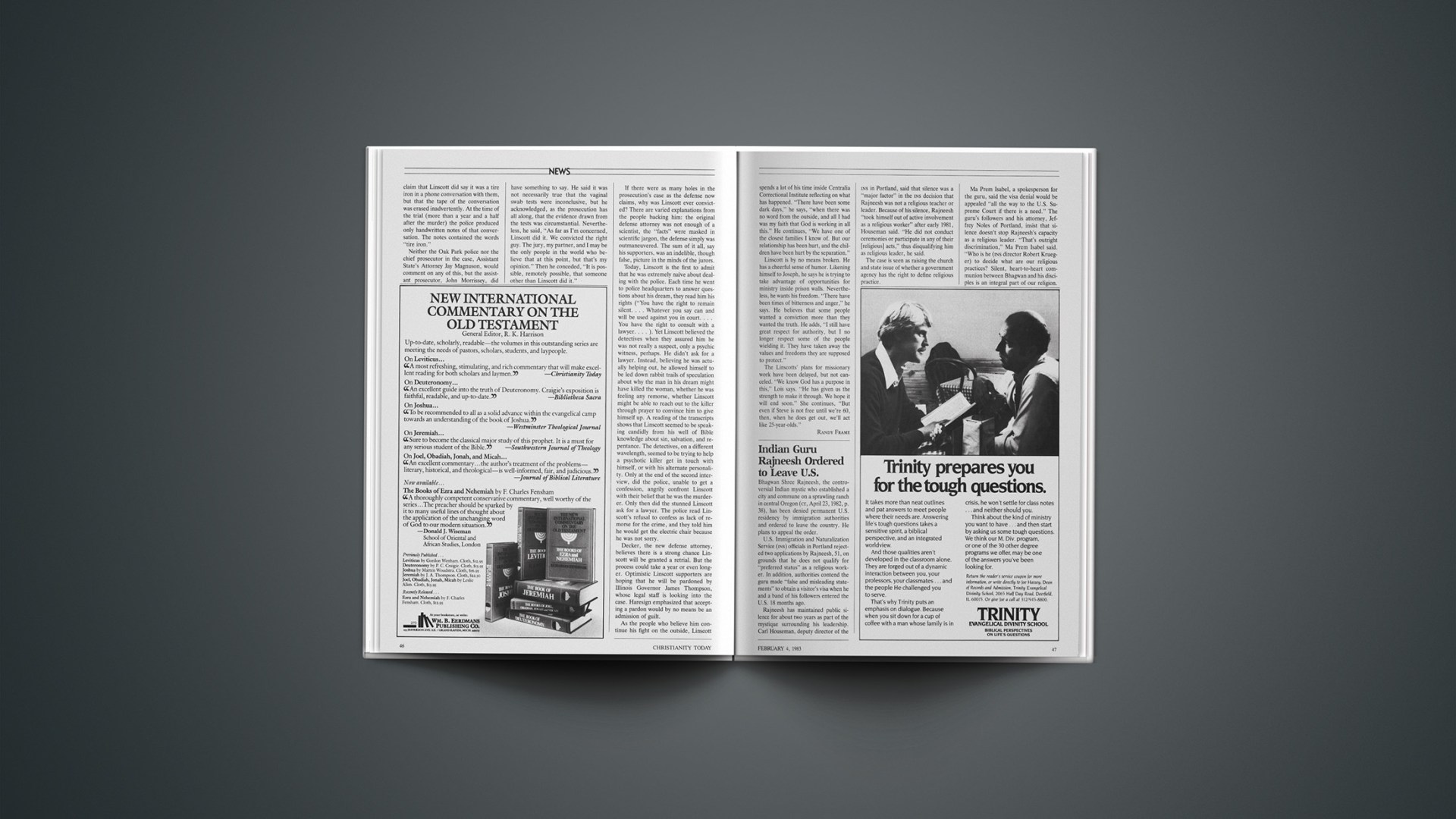Bhagwan Shree Rajneesh, the controversial Indian mystic who established a city and commune on a sprawling ranch in central Oregon (CT, April 23,1982, p. 38), has been denied permanent U.S. residency by immigration authorities and ordered to leave the country. He plans to appeal the order.
U.S. Immigration and Naturalization Service (INS) officials in Portland rejected two applications by Rajneesh, 51, on grounds that he does not qualify for “preferred status” as a religious worker. In addition, authorities contend the guru made “false and misleading statements” to obtain a visitor’s visa when he and a band of his followers entered the U.S. 18 months ago.
Rajneesh has maintained public silence for about two years as part of the mystique surrounding his leadership. Carl Houseman, deputy director of the INS in Portland, said that silence was a “major factor” in the INS decision that Rajneesh was not a religious teacher or leader. Because of his silence, Rajneesh “took himself out of active involvement as a religious worker” after early 1981, Houseman said. “He did not conduct ceremonies or participate in any of their [religious] acts,” thus disqualifying him as religious leader, he said.
The case is seen as raising the church and state issue of whether a government agency has the right to define religious practice.
Ma Prem Isabel, a spokesperson for the guru, said the visa denial would be appealed “all the way to the U.S. Supreme Court if there is a need.” The guru’s followers and his attorney, Jeffrey Noles of Portland, insist that silence doesn’t stop Rajneesh’s capacity as a religious leader. “That’s outright discrimination,” Ma Prem Isabel said. “Who is he (INS director Robert Krueger) to decide what are our religious practices? Silent, heart-to-heart communion between Bhagwan and his disciples is an integral part of our religion. And he gives spiritual guidance to disciples all over the world through Ma Anand Sheela, his personal secretary.”
Houseman said that his office had determined that Rajneesh had made “false and misleading statements” about his dire need to immigrate to the U.S. for medical attention. “He claimed he was suffering from cancer and needed a back operation, and that was not the case,” Houseman said. Followers of the frail Indian mystic maintain he suffers from asthma, diabetes, and a heart and back ailment.
Disciples of Rajneesh have been despised by Oregon residents since they moved to a 100-square-mile ranch-commune, now called Rancho Rajneesh, in the summer of 1981. The group moved its headquarters from Poona, India, and settled near the Oregon hamlet of Antelope. Residents, fearing takeover by the newcomers, attempted to disincorporate the village last spring, but Rajneesh’s disciples outvoted the old-time residents. Last month, Rajneesh’s followers were elected to head Antelope, thus becoming the first Eastern religious group known to take over an American city.
RELIGIOUS NEWS SERVICE
Theological liberalism, if left unchecked, will destroy evangelism in the Southern Baptist Convention, warned James T. Draper, the denomination’s president. The warning came at a recent gathering of evangelism directors in San Juan, Puerto Rico. Referring to an informal group of pastors who are opposing conservative efforts in the denomination, Draper charged that “the churches represented in the ‘denominational loyalist group’ are not winning anyone to Jesus and are not giving as much to missions as we are.”
The legality of a stamp commemorating the five-hundredth anniversary of the birth of Martin Luther is being contested. Americans United for Separation of Church and State and another church and state separation group have urged Postmaster General William F. Bolger not to issue it. W. Melvin Adams, executive director of Americans United, conceded that Luther had an important impact on secular history, but warned that issuing the stamp might imply U.S. government approval of Luther’s anti-Semitism.
Thomas and Katherine Tollesfrud have entered a “not guilty” plea to a charge that they are violating the state of Minnesota’s compulsory school attendance law. The couple told the Spring Grove school board they are educating their children at home because the public schools neglect spiritual values in their children’s education. The Tollesfruds belong to a group called Maranatha Ministries, whose members have withdrawn 17 students from public schools.
“Religious entities are not totally immune from responsibility under the civil law,” according to a ruling of the New Hampshire Supreme Court. In what is considered a landmark decision, the court ruled that four Catholic nuns, fired from their parochial school teaching posts, have a right to sue their bishop. Experts on constitutional law said the case points out the increasing involvement of the courts in intrachurch disputes.
Six protesters, including a Roman Catholic priest, have been arrested for pouring blood in the form of a cross outside an electronics plant whose employees were working on the MX missile. The three men and three women pleaded not guilty to trespassing. They said, “We pour our own blood in the sign of the cross as a sobering sign of first-strike death.”
Stiffer penalties and higher drinking ages have combined to make unprecedented progress in the war against drunk driving. In 1982, 18 states passed tougher drunk-driving laws, and 25 states raised their drinking age to 21. Also, Congress voted to provide $125 million in grants to states that act aggressively against drunken drivers. In Maine, the number of car accidents is down 41 percent. In Florida, there are 30 fewer people dying each month on the highways. Maryland residents are enjoying the lowest state highway death toll in 19 years, and the list goes on. Under congressional legislation, each state that makes drunk-driving controls a priority is now eligible for an additional 50 percent of its federal highway safety grant.
There are hints of a “religious renewal” in the United States before the end of the twentieth century. A Gallup study reveals that as many as seven in ten have felt at some point as though they were close to “a powerful spiritual life force that seemed to lift them out of themselves.” However, the report also showed that only one in eight says that he or she “would sacrifice everything for their religious beliefs, or God.” George Gallup, Jr., president of the organization, said the survey also revealed some worrisome trends in the religious community. Among them: lack of knowledge of the Ten Commandments, absence of spiritual discipline, anti-intellectual strains in religious life, and a growing belief in astrology.
A federal judge has blocked New Jersey public schools from requiring a minute of silence at the start of each day. The judge ruled in favor of the American Civil Liberties Union, which argued that the moment of silence for “contemplation and introspection” is really an unconstitutional attempt to reintroduce prayer in public schools.
The Canadian government has banned foreign students from entering the country to attend a Bible college being launched by The Way International in London, Ontario. Immigration Minister Lloyd Axworthy said The Way “is involved in forms of mind control and abuse, harassment against former members, as well as in activities to train its members in weaponry and ammunition.” Despite the ban, the director of the proposed college says that plans are proceeding.
A University of Washington sociologist has asserted that religious cults and sects will be strongest where traditional religion is weakest. Rodney Stark cites the high cult activity on the West Coast and the low church membership there. People who have no preference, as opposed to those who have a commitment to some kind of religion, are the most likely to believe in astrology, transcendental meditation, or spiritualism (communicating with the dead), according to Stark.
As a result of a merger, the Evangelical Church of North America and the Evangelical Church of Canada are now one denomination. Both were once part of the Evangelical United Brethren Church, but declined to become a part of the union that formed the United Methodist Church in 1966. The new denomination has more than 17,000 members in 190 congregations, is organized into seven annual conferences, and supports mission work, with more than 100 congregations in Bolivia.
The days of wandering are over for Jewish cadets at West Point. Late last year, ground was broken for a privately financed Jewish chapel. For years there have been chapels for Protestants and Roman Catholics, but none for Jews. At present, 49 of the 4,400 cadets are Jewish.
An unprecedented cooperative effort within the Christian recording industry is helping fight world hunger. Ten top Christian recording artists have combined to produce an album, entitled “Together … A Gift of Love to a Hurting World,” and have made outright donations of the songs and future royalties from the record to World Vision, an international Christian relief and development agency. Featured artists are Andrae Crouch, Dino, Amy Grant, the late Keith Green, Walter Hawkins, the Imperials, Evie Karlsson, Barbara Mandrell, Sweet Comfort Band, and B.J. Thomas. In its first 11 days of distribution, the album has sold more than 10,000 copies, according to figures from music stores nationwide.
The Reader’s Digest has charged that the National Council of Churches promotes Marxist causes. The Digest made similar charges against the World Council of Churches 10 years ago and again last August. An article by sociologist Rael Jean Isaac, published in the January 1983 issue, states that the National Council supports “revolution instead of religion. The article supports the Institute on Religion and Democracy (IRD), an organization headed by United Methodist evangelist Edmund Robb. The IRD holds that the NCC favors Marxist-backed liberation groups in Third World countries over moderate democracies.
Guatemala’s evangelical president, Efrain Ríos Montt, who was drafted after a coup last year, announced last month that he will hand over power to an elected government in 1985.
“He’ll be walking into a hornet’s nest,” said one American Jesuit priest of Pope John Paul II’s tour of Central America and the Caribbean later this month. He will come face to face with some of the most politically active priests in the world and with leftist and rightist extremists both attempting to gain his support. He must decide whether or not to stop in Nicaragua, where priests are part of the junta in defiance of his desires, and how to relate to Guatemala’s President Ríos Montt.
Offices of the European Evangelical Alliance have switched from London to West Berlin. The December move followed the departure of Gordon Landreth as general secretary (to become administrator of Trinity College, Bristol, an Anglican seminary). Peter Schneider, general secretary of the West German Evangelical Alliance was chosen to succeed him. The president of the World Evangelical Fellowship-related regional body, however, remains a Briton, Morgan Derham of London.
France’s socialist government plans to put the country’s more than ten thousand religious schools firmly into the state orbit. The schools—mostly Catholic—which educate more than 15 percent of France’s youth, would continue to receive state subsidies that have made low fees possible. But the price, if the plan is approved, would be these concessions: local government representatives would sit on their management boards; education authorities would appoint head teachers and oversee the curriculum; parents would enjoy much less choice about which private schools their children could attend; and private teachers would gradually become public employees.
A West German state has begun refusing visa renewals for missionaries, but the motivation does not appear to be religious, and the problem is being negotiated at a higher level. German authorities have grown concerned about burgeoning numbers of “guest workers” within their borders—Turks and others from West Asia and North Africa. Restrictions introduced in the state of Baden-Wurttemberg, and designed to roll back their influx, have, when applied across the board, affected religious workers. A number of such revoked or reduced residence permit actions have been suspended pending a ruling to clarify the situation.
A letter from imprisoned Christians in Czechoslovakia reached Keston College in England recently, expressing “feelings of grief and bitterness” after hearing Billy Graham’s television interview at the end of his visit. They expressed “disappointment” at hearing him speak well of those who regard Christians “as an irksome remnant of bourgeoisie ideology and obscurantism.” They inquired why he did not seek contact with those suffering for their faith and ask officials about the number of seminary students, of religious books published, and about those who have lost their jobs because of their faith. Graham made a preaching tour through East Germany and Czechoslovakia last year.
The Romanian government has imposed a strict quota on the number of theological students, according to the Swiss Catholic press agency KIPA. Roman Catholics, who number 1.6 million, will be allowed to send only 30 new students to seminary each year; Romania’s 180,000 Lutherans will be able to send only three students, and the country’s 1 million Reformed can send only three. The new measure does not affect the Orthodox church.
The Pope has openly named the first resident cardinal in the history of the Soviet Union. He is 78-year-old Julijans Vaivods of Latvia. In 1979, John Paul named a cardinal in pectore (secretly), widely believed to be Julijonas Steonavicius, bishop of Vilnius in Lithuania. Vilnius has been exiled to the Lithuanian town of Zagare since 1961, unable to perform his duties in the archdiocese.
Soviet Pentecostal preacher and emigration activist Vasili Shilyuk was sentenced last month to three years of imprisonment.
Bibles—two Boeing 707s full of them—have been airlifted to Uganda by the British and Foreign Bible Society. The unusual move was taken in order to get Scripture supplies moving, since surface supplies have taken up to a year to arrive. Each fifth grader in Uganda is supposed to have an English-language Bible for study. And some 200,000 pupils enter fifth grade each year. The airlift brought in 50,000 English-language Bibles and 50,000 in Luganda, a major language of Uganda. The first complete Bible in Kakwa, another Ugandan language, is now ready for printing.










